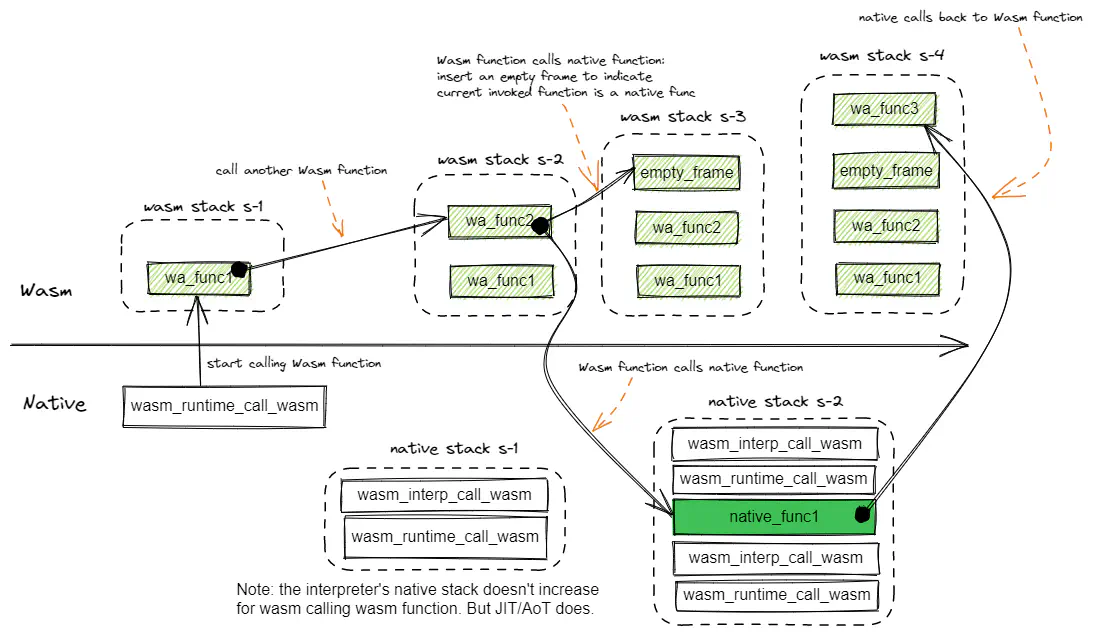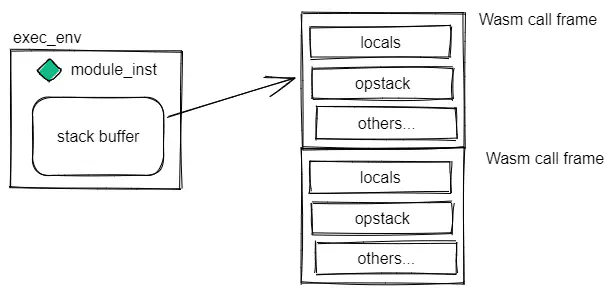Understand the WAMR stacks
Posted in introduction on March 18, 2023 by Xin Wang and Wenyong Huang ‐ 3 min read
The status of stacks
During the WAMR executes a Wasm function, there will be a Wasm stack created and used. For interpreter mode, as the Wasm functions intercall, the Wasm stack frames will grow, while the native stack keeps unchanged.
When the Wasm calls into a imported native function and the native function then call into some Wasm function, the native stack will add a frame, and an empty frame will be inserted into wasm stack to indicate the function is imported from native.

Execution environment (exec_env)
Before native calling a Wasm function with wasm_runtime_call_wasm, a exec_env should be prepared by calling wasm_runtime_create_exec_env(). It will allocate a stack buffer with size given in the function call.
/* lookup a WASM function by its name */
func = wasm_runtime_lookup_function(module_inst, "fib", NULL);
/* creat an execution environment to execute the WASM functions */
exec_env = wasm_runtime_create_exec_env(module_inst, stack_size);
/* arguments are always transferred in 32-bit element */
uint32 argv[2];
argv[0] = 8;
/* call the WASM function */
wasm_runtime_call_wasm(exec_env, func, 1, argv) ;
During executing Wasm functions, the exec_env is mostly the first parameter in each frame of the native stack. The runtime requires the native APIs for Wasm to import must have the first parameter as exec_env. The detailed guidance and samples can be referred fom Export native API to WASM application.
In the interpreter mode, every function call will add a new call frame in the stack buffer. All the Wasm LOCALs and opocde stack of a function will be located inside the call frame.

In the AoT/JIT mode, the call frames of Wasm function are integrated with the runtime native stack frame. Being different with interpreter mode, each Wasm function call will introduce a new call frame in the runtime native stack.
Normally the stack buffer in the exec_env is no longer used for AoT/JIT. However it can be still used in a few situations:
- dump call stack,
- dump memory profiling,
- dump perf profiling
The dumping option can be enabled through adding compilation option -DWAMR_BUILD_DUMP_CALL_STACK=1 for runtime, and --enable-dump-call-stack for the wamrc. When it is not enabled, the stack buffer can be zero length (?)
The default wasm stack size
The WAMR provides some APIs like wasm_application_execute_func that further simplified the execution of Wasm functions. The exec_env allocation and releasing will be done automatically.
bool
wasm_application_execute_func(WASMModuleInstanceCommon *module_inst,
const char *name, int32 argc, char *argv[])
The host needs to provide the default size for runtime creating a stack for the above situation. This can be done through passing non-zero value to the parameter default_stack_size in the function call of module instantiation as below.
module_inst = wasm_runtime_instantiate(module, default_stack_size,
host_managed_heap_size,
error_buf, sizeof(error_buf));



